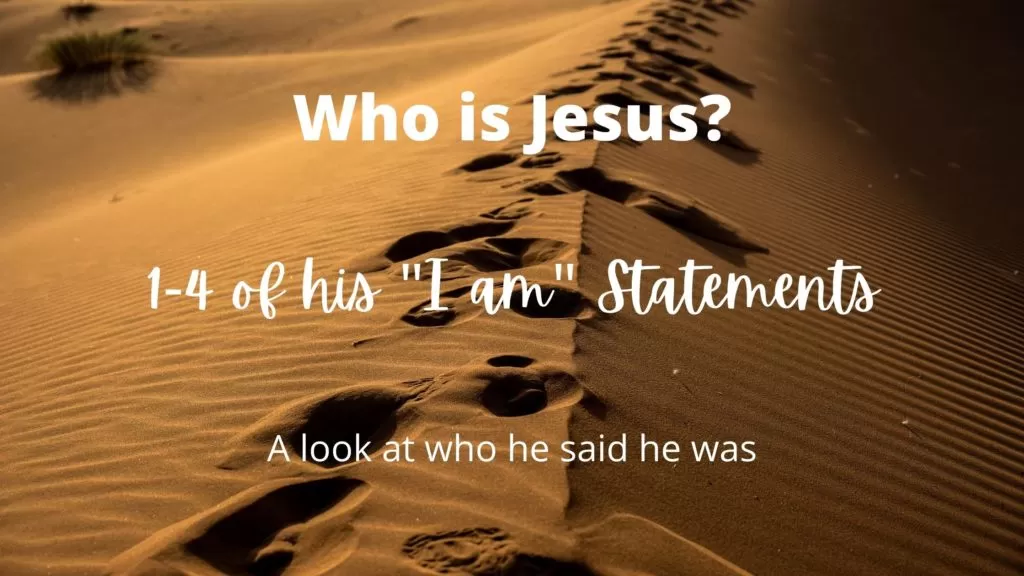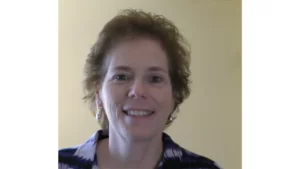Continuing with the “Who Is Jesus?” series, let’s look at what Jesus said about himself. Many people call this “The 7 ‘I am’ Statements” found in John’s book. In other words, Jesus began his sentence with “I am,” and he said this seven times. The first four of the “I am” statements will be discussed in this blog. So let’s dive in and take what may be a little different look into these statements.
The Bread of Life
35 Then Jesus declared, “I am the bread of life. Whoever comes to me will never go hungry, and whoever believes in me will never be thirsty. (John 6:35 NIV)
Jesus tells the crowd that he is the Bread of Life. He makes this statement in Capernaum on the Sea of Galilee. The yearly Passover feast was near, which required the Jewish people to come to Jerusalem (Deut 16:16). No doubt the roads were pretty busy, with families making their way to the city. Jesus had just multiplied the loaves and fishes to feed five thousand people who had listened to him teach. He then crossed the Sea of Galilee, where he was found in the city of Capernaum. The crowds began asking for a miraculous sign and noted that their forefathers ate the manna in the desert with Moses. (The manna appeared on the ground each morning and was given by God). Exodus 16:4 says that God gave them bread from heaven to eat.
Jesus explained that Moses didn’t give them their daily bread, but rather, God did. At this point, he declared that he is the bread of life, and whoever believes in him will never go hungry (or thirsty). Jesus stated that just as bread sustained them physically, he was the bread that could support them spiritually.
A couple of intriguing things to note. Jesus was born in Bethlehem. The word Bethlehem in Hebrew is Beit-Lechem. The literal translation is House of Bread. Another interesting fact is that there was something called The Bread of Presence (Lev 29:8-9). Twelve loaves of bread were made each Sabbath and set before the lamp in the temple’s Holy Place. Only the priests were allowed to eat this bread. The Hebrew word for this bread is lechem panim which means the bread of faces. The face of God is present through Jesus, who said, “Anyone who has seen me, has seen the Father” (John 14:9). The apostle Paul said God’s glory was displayed in the face of Christ (2Cor 4:6). Please read it for yourself, meditate on it, and come to your conclusion.
The Light of the World
When Jesus spoke again to the people, he said, “I am the light of the world. Whoever follows me will never walk in darkness, but will have the light of life.” (John 8:12 NIV)
Although Jesus is talking about spiritual light, what is the purpose of physical light? No, it’s not a trick question. Light gives us the ability to see when it is dark. Can darkness overcome light? Hmmm…What is the first thing we do if the power goes out when it’s dark? We feel our way to the junk drawer and start rummaging through it, looking for a flashlight! And then we find out the batteries are dead, and we continue our scavenger hunt! Or, we attempt to find candles and matches. If we’re really on top of our game, we use the flashlight function on our phones! Once you do, is it still dark? Nope, and it is bright enough to find your way. That’s how Jesus is. You may feel like you’re in a dark place, but if you grab ahold of Jesus, he will shine a light on a path to get you out of the dark.
The Gate (Door) and The Good Shepherd
“Therefore Jesus said again, “Very truly I tell you, I am the gate for the sheep. 8 All who have come before me are thieves and robbers, but the sheep have not listened to them. 9 I am the gate; whoever enters through me will be saved. They will come in and go out, and find pasture. 10 The thief comes only to steal and kill and destroy; I have come that they may have life, and have it to the full. 11 “I am the good shepherd. The good shepherd lays down his life for the sheep. 12 The hired hand is not the shepherd and does not own the sheep. So when he sees the wolf coming, he abandons the sheep and runs away. Then the wolf attacks the flock and scatters it. 13 The man runs away because he is a hired hand and cares nothing for the sheep.” (John 10:7-13 NIV)
Jesus declares he is the gate and the Good Shepherd in one passage. In the paragraph before this, he spoke metaphorically about the entrance, sheep, and shepherd. Those Jesus spoke to didn’t understand what they were being told, so the above passage was his explanation. Jesus states that he is the only “gate” to God the Father. Others have come and will come in the future and try to lead the “sheep” (believers) astray.
We need to know what a sheep pen looked like in Jesus’ time to understand this passage. When we hear about a sheep pen, we likely think of a wooden or barbed wire fence with a gate or two. During Jesus’ time, a sheep pen was made of stones piled or set on top of each other, reaching about three feet in height. There was only one gate that was a narrow, door-less opening. The gate was guarded by a hired hand.
Contrary to popular belief, sheep are smart. In the animal world, they rank just below pigs. But sheep are “flock” animals that stick together. If one sheep gets spooked and runs, they will all run, even if it’s the dumbest sheep in the flock. However, they trust the shepherds who feed them. They can also recognize faces and come to the pen gate when the shepherd calls for them. Sheep need safety, water, and pastures.
Now imagine that the sheep are people who are enclosed in a pen. To survive, everyone needs to move through the gate and out into green pastures for food and water. If you want to move out into the food and water God has for you, you will need to get through the gate. In this case, it is Jesus. To know God, people need to go “through Jesus,” who is the Good Shepherd that died for the sheep. Going through Jesus allows us to find a good pasture and gives a believer an abundant life. It doesn’t mean there will never be hardships or troubles, but it does mean that there will always be a light in the darkness!
Spend time reading and pondering the scripture passages in this blog. If you need help understanding the concepts, ask God. In the Amplified Bible, Psalm 119:130 says:
The unfolding of Your [glorious] words give light;
Their unfolding gives understanding to the simple (childlike).
Until the next blog, be blessed!



